Maurice Sendak, author-illustrator of the iconic children’s book Where The Wild Things Are, has died at age 83 due to complications from a recent stroke.
In addition to Wild Things, Sendak produced numerous other titles, including The Sign on Rosie’s Door, Higglety Pigglety Pop, Seven Little Monsters and 2011’s Bumble-Ardy. He also created animated works like Really Rosie, a stage adaptation of Wild Things Are and sets for operas and ballets like The Nutcracker, The Magic Flute and Hansel and Gretel. Sendak collaborated with out playwright on an English version of the Czech children’s opera Brundibar, which was released as a children’s book in 2003 and performed in full in 2005. With over 100 books written and drawn in a half-century, Sendak’s impression on our collective imagination is truly indelible.
The curmudgeonlyauthor was the subject of Tell Them Anything You Want, an excellent documentary by Lance Bangs and Spike Jonze (director of the film version of Wild Things), which you can watch in its entirety above.
Though he lived with Eugene Glynn, a psychoanalyst, for over 50 years (until Glynn’s death in 2007), Sendak didn’t officially come out until 2008. When asked by the New York Times to name a question he’d never been asked, he responded: “Well, that I’m gay… I just didn’t think it was anybody’s business.”
How about we take this to the next level?
Our newsletter is like a refreshing cocktail (or mocktail) of LGBTQ+ entertainment and pop culture, served up with a side of eye-candy.
Rest in peace, Mr. Sendak. And now, let the wild rumpus start!
Photo: HBO

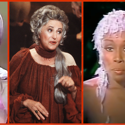
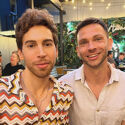

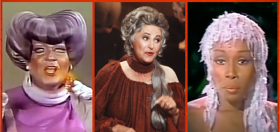
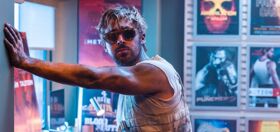







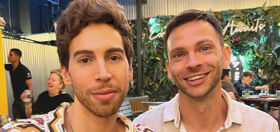


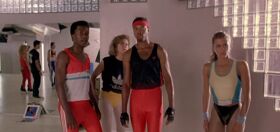


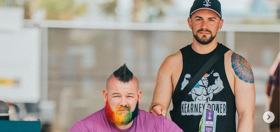
Larkin
I love you Carmen!
Larkin
bah, wrong thread…. sorry that you are dead.
Michael Bedwell
While THIS time the New York Times didn’t push the subject of their obit back in the closet, most people will read of Sendak’s death through the syndicated story by the ASSociated Press who didn’t think it important to mention he was gay and lived with the same man for fifty years! [A longer version of the AP obit does reference that in ONE sentence—surely a relationship that lasted HALF-A-CENTURY deserves more than that, as well as the fact that Sendak donated $1 million to New York City’s Jewish Board of Family and Children’s Services to memorialize Glynn, who had treated young people there. They named the Dr . Eugene D. Glynn/YCL Counseling Center in Washington Heights after him. Glynn had also been a consultant to Gay Men’s Health Crisis. In 1993, Sendak told a reporter, “By watching friends die of AIDS, by working for the Night Kitchen Theater, I’ve become a more social, political animal.” That year he published his darkest book, “We Are All in the Dumps With Jack and Guy,” “a book about AIDS and homelessness and skies darkened with black clouds from a concentration camp that cooks children. A book that describes a homeless band [of children including Jack and Guy] roaming the gutters of a nihilistic ’90s New York City, their suffering a living curse on an age that championed the mighty and chewed up the meek. It is a cry of anguish, a shout of rage, that starts with monstrous rats stealing a helpless [little boy]. [Jack and Guy] rescue the [boy] and kittens before the rats take them to St. Paul’s Bakery and Orphanage, [and take it] to the homeless camp, where children wear AIDS memorial skeletons on their ragged clothes and huddle in newspaper real estate pages for warmth.” The pages of the book can be viewed at:
http://browseinside.harpercollinschildrens.com/index.aspx?isbn13=9780062050144
Chuck
Learned of his death via CBS evening news, where they did not mention that he was gay. The NY Times did finally mention his companion, on the second to last paragraph of his obit, 3 pages in. This extremely talented gay author affected the lives of so many, surely he is one of our own to take pride in, and young gay kids nationwide should know that he was like them.
CBRad
An EXTREMELY important gay American. WHERE THE WILD THINGS ARE has been a staple of so many childhoods.
Ambrose
A good and courageous man who understood the central role of playfulness in a life well lived. He walked lightly, but left a profound imprint.
Brand
God bless Maurice Sendak. My (gay) uncle gave me In the Night Kitchen when I was two. I loved that book. The same uncle gave me a box set of C.S. Lewis’ Narnia books. (Yeah, he was a cool gift-giver!)
There was a point in my childhood when I boxed away all my “childish things”, as the saying goes, which is a real shame because while I continued to revisit and revere Narnia, the brilliance of Sendak is a distant recollection.
Something tells me it is a “childish thing” to become embarrassedly dismissive of the things of childhood; this Mother’s Day I will find that box and—perhaps with my mother—re-read In the Night Kitchen. And then I will write my uncle a proper thank-you note.